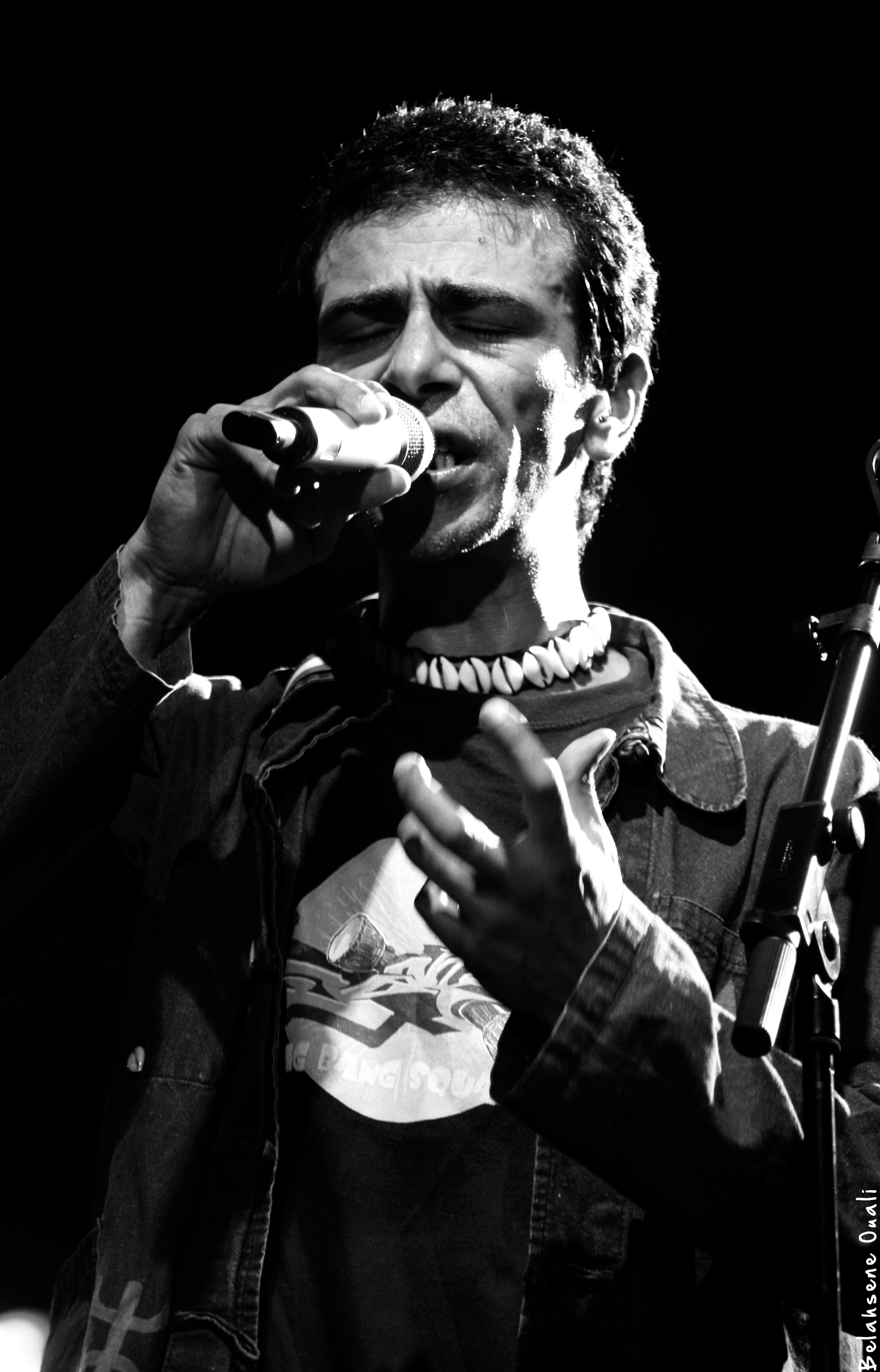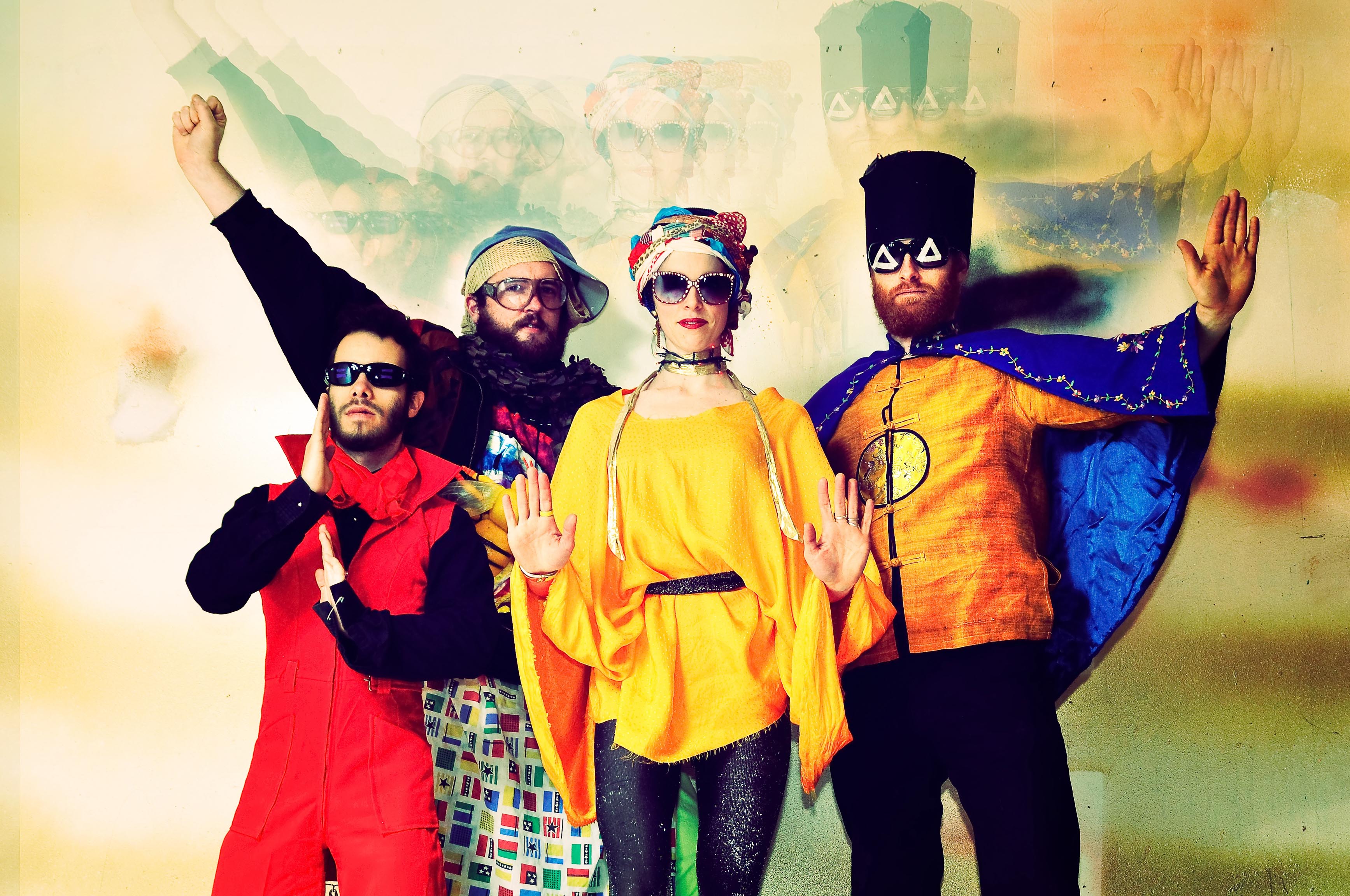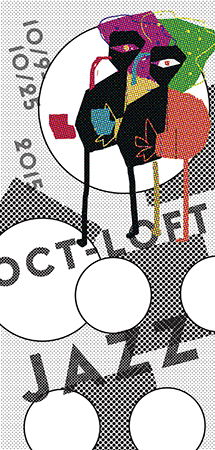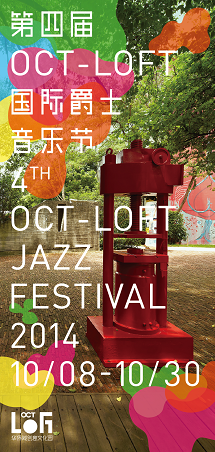Amazigh Kateb三重奏
Amazigh Kateb Trio
法国 France / 阿尔及利亚 Algeria
时间 Time
2015.10.09 21:20 – 22:20
场地 Venue
华侨城创意文化园北区B10现场 B10 Live, North District of OCT-LOFT
演出者 Artists
Amazigh Kateb – 格纳瓦三弦贝斯 Guembri / 人声 Vocals
Mohamed Abdenour – 曼陀林 Mandole / 和声 Backing Vocals
Karim Ziad – 鼓 Drums / 打击乐 Percussions / 人声 Vocals
Amazigh Kateb
如果你了解Amazigh Kateb自小就活跃于舞台的经历,你就会更能理解他的音乐轨迹。1972年9月16日,Amazigh出生于阿尔及尔,作为阿尔及利亚小说家/剧作家Kateb Yacine的儿子,他从小就耳濡目染,沉浸在诗歌和音乐的世界,而同时,在那样的环境下成长,他的骨子里也流淌着反抗与不屈服的血液。对于他来说,自幼接触的剧院舞台就和自己家一样熟悉。
他的名字“Amazigh”在柏柏尔语里是“自由的人”的意思。1992年6月27日,他组建了Gnawa Diffusion乐队,用特有的三弦贝斯Gumbri和金属响板Krakeb这样的西北非马格里布乐器演奏格纳瓦出神音乐(Gnawa Trance)[1]。这种音乐,是马格里布的灵歌,歌颂久经压迫后的重返自由,又把戏谑的枪口对准了扭曲的现代世界。它那令人惊喜的旋律里,融合了爵士和雷鬼,又穿插着饶舌和ragga[2]。这种音乐正是Gnawa Diffusion的灵魂之所。
他们最近的一张专辑是《Shock El Hal》,发行于2012年,在那之后他便带领着Gnawa Diffusion马不停蹄地进行着巡演。Amazigh现已计划与鼓手Karim Ziad展开全新的合作,预计将在2016年2月份发行新专辑。在Gnawa Diffusion成员各自活动期间,Amazigh Kateb制作了个人专辑《Marchez Noir》,一张反映了当下世界的自传性作品。“这张专辑淋漓尽致地表现了爱、笑声、舞蹈与汗水。由倾诉的欲望而生,它承载的是Amazigh过去二十年来所有的放逐与感伤,经历过的旅程和风景,孤独的时刻和集体的记忆。”
情系根之所在,Amazigh的演奏与歌唱一直沿承着同样的诗意腔调,用源自北非的节奏在传统与现代之间自在游走,在Gnawa、Chaâbi[3]和Raï[4]音色之中融入嘻哈、摇滚、雷鬼、Ragga和电子乐等这样的当代乐曲风格。
此外,Amazigh也为剧院作品进行配乐,包括Mustapha Benfodil的《Les Borgnes ou le colonialisme intérieur brut》和Kateb Yacine的《Le poète comme un boxeur》。他自己还开设了多个工作坊,不仅仅是在高中,还在监狱等各种不同的地方举办,内容涵盖写作、作曲、歌唱和艺术表达等等。
[1] 格纳瓦出神音乐(Gnawa Trance):格纳瓦音乐是北非地区最有影响力的民间音乐种类之一。它也常被西方人称作是格纳瓦出神音乐,因为这种音乐仿佛具有引发想象、让人“出神”的神奇效力。
[2] Ragga:Raggamuffin音乐,常被简称为ragga,80年代发源于牙买加,是dancehall和雷鬼音乐风格的一个分支,乐曲的主要构成是电子乐。和嘻哈风格相似,采样对于ragga音乐来说也是重要的组成元素。
[3] Chaâb:来自北非的一种音乐风格。它常见于婚礼和节事活动。流行语言的使用和新韵律的创作已经使这种风格称为当地舞曲的必要元素。
[4] Raï:30年代起源于阿尔及利亚城市瓦赫兰和艾因泰穆尚特,流传于贝都因牧羊人的一种民间音乐,融合了西班牙、法国、非洲和阿拉伯的音乐元素。
Amazigh Kateb
Knowing that he fell on a stage when he was young, everything is getting clearer. Son of the Franco-Algerian novelist and playwright Kateb Yacine, Amazigh is born in Algiers the 16th September 1972. He was immersed in a poetic and musical universe but also in a culture of resistance and insubordination. He was used to the paternal theatre’s stages since the earliest age.
His name, Amazigh, means “the free man” in Berber language. On the 27th of June 1992, he created the band Gnawa Diffusion, playing Maghrebo-African instruments (Gumbri and Krakeb), the Gnawa Trance[1], a Maghrebian gospel that becomes liberation after oppression, a sense of humor that targeted all the “screws” of the modern world, surprising rhythms fusing jazzy sonorities to reggae, passing by rap and ragga. Gnawa Diffusion’s universe is now well anchored.
Since 2012, he is the leader of the band Gnawa Diffusion which is always on tour with their last album “Shock El Hal”. In 2016, Amazigh will begin a new collaboration with Karim Ziad. The release of the album is planned for February. During Gnawa Diffusion’s separation, Amazigh Kateb produced a solo album “Marchez Noir”, which is an autobiographical work representing our current world. “This album is an obvious representation of love, laugh, dance and sweating. It is the outcome of a need to make a recap of 20 years of exile and grief, roads and stages, loneliness and collectivity.”
Faithful to his origins and roots, Amazigh is still playing with the same poetic cadence, to the North African rhythms between tradition and modernity, combining Gnawi, Chaâbi and Raï tones with other contemporary ones like hip hop, rock, reggae, ragga and electro.
Besides, Amazigh is also working on music compositions for theatre purposes: “Les Borgnes ou le colonialisme intérieur brut” by Mustapha Benfodil and “Le poète comme un boxeur” by Kateb Yacine. Amazigh also leads multiple workshops (writing and composing workshops, singing workshops, writing and artistic expression workshops) within high schools but also in prison setting for example.
[1] Gnawa music is one of the most influential folk music genre in North Africa. It is often called Gnawa Trance music by westerners, for it seems to have this special power to inspire imagination.
[2] Ragga: Originated in Jamaica during the 1980s, raggamuffin music, usually abbreviated as ragga, is a subgenre of dancehall music and reggae, in which the instrumentation primarily consists of electronic music. Similar to hip hop, sampling often serves a prominent role in raggamuffin music.
[3] Chaâbi: It’s a music style of North Africa. It is frequently found in weddings and this style is often associated with the festivals. The use of popular language and the creation of new rhythms have made this style an essential complement to the dance.
[4] Raï: It is a form of folk music that originated in Oran and Aïn Témouchent, Algeria from Bedouin shepherds, mixed with Spanish, French, African and Arabic musical forms, which dates back to the 1930s.
网站 Website
http://turnagainmusic.com/2015/07/20/amazigh-kateb/
脸书 Facebook




